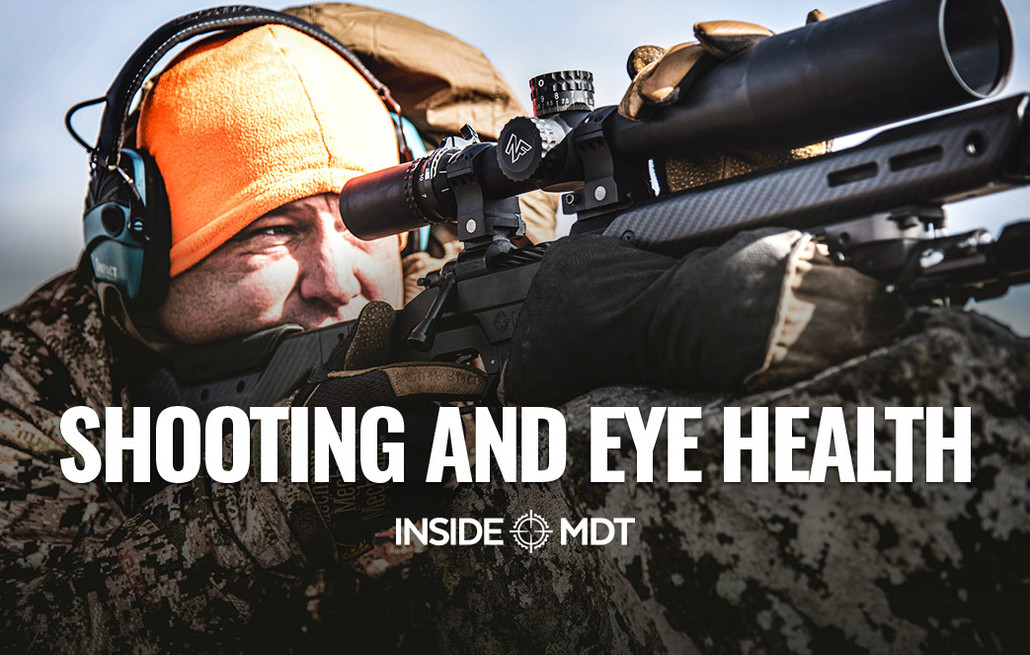Posted by Lowell Strauss on 2023 Apr 20th
Shooting And Eye Health - Inside MDT
Like many, I took my eyes for granted. My prescription glasses gave me the sharp sight needed for everyday tasks, so I didn't think much about my vision. Then one morning, I woke up, and everything seemed blurry. I soon discovered the problem was in my right eye—my dominant eye for shooting!
THE BACKSTORY
It was a Wednesday morning of a busy week, and a lack of sleep was taking its toll. My day started like any other; a cup of coffee before breakfast to fire me up. Everything seemed a little hazy as I moved about the kitchen, but I dismissed it as needing more time to wake up. I heard my family stirring and looked at the clock to check the time, and instead, I only saw a dark gray blob. What was going on? As I assessed the problem, my immediate concern was how this blurriness would affect my shooting. I covered my right eye and was pleased to see everything was "normal." Still, when I switched, covering the other eye, everything was cloudy with a dark patch in the center! Consulting Dr. Google is probably the worst thing to do for any medical diagnosis, but it's what I did to see if I could figure out the problem. After 48 hours of no improvement, I called my optometrist and booked an appointment, hoping she could shed some light on my issue.
THE DIAGNOSIS
Today's optometrists use advanced technology when evaluating eye health. Retinal Imaging takes a digital picture of the back of your eye and helps detect and diagnose problems. Optical Coherence Tomography provides an even more detailed image from within the retina. My doctor used both to determine what was happening to my eye. I learned I had Central Serous Retinopathy (CSR), a condition where the macula separates from the eye tissue behind it, and fluid builds up between the two layers. The macula is part of the retina responsible for our central vision, color vision, and fine details.

Central Serous Retinopathy (CSR), a condition where the macula separates from the eye tissue behind it, and fluid builds up between the two layers.
CSR typically occurs in people between 20 and 50, and men are six times more likely to develop CSR than women—a check in both boxes for me. My doctor said CSR usually affects only one eye and will typically go away on its own. But, up to half of those who get it once will have a repeat episode. Again, I fit the normal distribution; this was my second time at my optometrist with CSR in the last ten years. Six weeks later, and to my delight, the CSR cleared, and so did my vision. Nobody knows what causes the macular separation and fluid build-up, but research shows that stress may aggravate the problem. The best prescription for me was range time to relieve some stress. It was time to take my eye health more seriously.
MAINTAINING EYE HEALTH
In my case of CSR, the fluid under the macula temporarily blurred my vision. Permanent macula damage is more serious, causing the central vision to appear blurry, distorted, or dark. There are two forms of macular degeneration: dry macular degeneration, the most common type, and wet macular degeneration, a progression, and a more severe type of the dry form.

Sunglasses can protect your eyes from harmful UV rays.
A healthy macula is about 0.25mm (0.0098") thick. Over time, tissue in the macula may thin (degrade) and lose the cells responsible for vision. Age, family history (genetics), race, smoking, obesity, and cardiovascular disease are all risk factors. The symptoms of dry macular degeneration include blurring and blank spots in the eye's central vision. Wet macular degeneration occurs when new blood vessels grow below the retina. The new vessels leak blood and fluid into the macula, causing scarring and rapid vision loss.

PRO TIP - Having a hard time finding targets due to aging eyes? Consider a red dot on your rifle. Check out our articles on red dots.
There is no cure for macular degeneration, but treatments may slow or stop it from worsening. The earlier treatment starts, the more vision is likely to be saved. Clearly, vision is a critical part of shooting sports, and eye health is not something to take lightly. Regular check-ups are essential to catch eye health changes early and hopefully slow their progression. But even more important is what we do daily to keep our eyes healthy. I learned the following in researching ways to prevent another episode of CSR, lower my macular degeneration risks, and improve my overall eye health.
- Eat Well – A diet with omega-3 fatty acids and minerals like lutein, zinc, and vitamins C and E is good for the eyes and body. Adding green leafy vegetables like spinach, fish (like salmon and tuna), eggs, nuts, and beans are all good choices. Maintaining a healthy weight reduces the risk of type 2 diabetes, a leading cause of blindness in adults! A balanced diet, along with micronutrients, contributes to eye health.
- If You Smoke, Quit! – Smokers are more likely to develop cataracts, macular degeneration, and other eye diseases.
- Wear Sunglasses – Sunglasses protect your eyes from damaging ultraviolet (UV) rays. Choose a pair that blocks both UVA and UVB radiation. Wraparound lenses help protect your eyes from the side. For shooters, consider the quality of the lens; inexpensive lenses may distort the view through your riflescope. Why buy a $3000 riflescope and look through it with a $10 pair of sunglasses?! Contact lenses offer some UV protection, but sunglasses protect better.
- Use Safety Eyewear – Wear safety glasses for protection when working with hazardous materials. In shooting sports, sunglasses made with polycarbonate lenses double as safety glasses. Still, there are many times when clear glasses are more appropriate. I also wear safety glasses for rifle cleaning, handloading (especially when priming), and indoor shooting. Goggles (tinted or not) prevent dirt and debris from getting into the eyes.
- Reduce Screen Time – Staring at your phone or computer for too long can cause eyestrain, dry eyes, headaches, plus neck, back, and shoulder pain. None of these things are good for your eyes or your shooting.

Active lifestyle, clean living, and a good diet are necessary for maintaining eye health.
CONCLUSION
Sometimes it takes a health scare to change a lifestyle for the better. There was a time in my life when I felt 'bulletproof,' and I didn't need to be careful, especially with my eyes. My second bout of CSR changed that and made me reflect on how critical my eyesight is for the activities I love—shooting and hunting. We only get one pair of eyes; I'm caring for mine.
HARD SKILLS FROM MDT
- Hunting In Inclement Weather
- How To Optimize Your Rifle For Positional Shooting
- Rangefinders: Testing Beam Divergence And Reticle Alignment - Inside MDT
- Torque Wrench Basics
- Magazine Mod for a Howa Barreled Action
- How to Troubleshoot Your Rifle System
- Keep Calm and Shoot On: How to Manage Stress
- Fighting The Flinch
- How to Zero a Rifle
- Maximize Performance with Mental Imagery
- How to Paint Your Rifle
- How to Become a Pro Shooter Without Ammunition
- 4 Ways To Range A Target
ABOUT THE AUTHOR
Lowell Strauss began shooting at a young age, eliminating pests from his family's farm. Later he started hunting, then offseason target shooting. His fascination with guns and how they work led him to join the Canadian Forces Primary Reserves, where he trained and served five years as a Weapons Technician. Lowell is currently a hunter and firearms safety instructor, target shooting and biathlon coach, and a full-time freelance writer and photographer focusing on shooting sports and the outdoors. IG and Facebook: @straussoutdoors @theBallisticsLab


 CAD
CAD
 Euro
Euro
